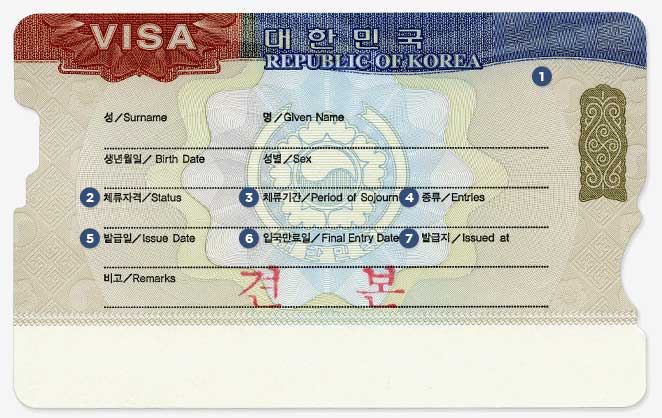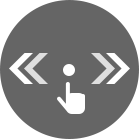A Visa is a kind of endorsement or acknowledgment, whose specific meaning differs from country to country. Generally speaking, however, it is used to mean one of the following two things; One being the 'permission to enter' a given country, and the other being the 'consul's recommendation for a foreigner's entry request.’
In the case of the Republic of Korea, the latter definition is used. Therefore, even if one were to have a Korean visa, one can still be denied entry to Korean soil should an immigration officer find some requirements unsatisfactory after inspection.
Sample of Republic of Korea VISA

- ① No. of Visa : Serial No. of Visa Issuance
- ② Status : Type of social activities or status of Foreigners while their stay in Korea
- ③ Period of Sojourn : The permitted term of stay starting from the date of entry into Korea
- ④ Entries : Visa Types, single-entry visa/multiple-entry visa
- ⑤ Issue Date : Visa Issuance date
- ⑥ Expiration Date : The Valid Term of Visa/ After this date, the visa is automatically rendered void.
- ⑦ Issued at : Where the visa was issued.
Overall Types of Visas
Not all foreigners receive the same visa: the proper visa will be issued depending on the particular situation of the individual. If you enter Korea on a B-1 or B-2 tourist visa (an automatic visa agreement between many countries and Korea), you will need to change your visa type to a proper student visa before your school program begins. Students are strongly advised to consult the Immigration Contact Center by dialing 1345 without the area code.
[Student Visa Types]
| Period of Stay | Visa Type | Eligibility | Required for Entry | Required for Departure |
|---|---|---|---|---|
| More than 91 days |
Study (D-2) |
|
Passport, Visa | Passport, Alien Registration Card, Re-entry Permission from Immigration Office(if leaving for more than 1 year) |
|
Language Training (D-4) |
|
|||
| Less than 90 days |
Temporary Visit (C-3) |
|
Passport, Visa | Passport |

A student visa can either be obtained at a Korean Consulate abroad, or through the local Immigration Office in Korea.
[Note]
- If you have a C-3 visa or a type of short-term visa instead of a D-2 visa, you must change your visa status within 30 days after arriving in Korea.
- There are two types of visas: a single entry and a multiple entry visa. If you want to travel abroad during your stay in Korea, we suggest you get a multiple entry type. The embassy or a consulate will issue you a single entry visa if you do not specifically request otherwise.
- If you want to take Korean language classes, you can apply for a D-4 visa. More information is available at Yonsei Korean Language Institutes (http://www.yskli.com)
General Student(D-2) Visa
[What is a D-2 Visa?]
Korean law defines a visa as a “recommendatory action by a consul to apply for entry by a foreigner.” Those not meeting the necessary requirements may be denied entry into the country. In general, international students are required to apply for a D-2 (General Student) visa.
[“Certificate of Admission” for the D-2 Visa]
After international students have been admitted and paid the tuition fee, they will be able to receive their Certificate of Admission(COA). This must be taken to the Korean Embassy or Consulate in your country to apply for a D-2 visa.
[Basic required documents for D-2 visa application]
Documents may be added or exempted as needed at the discretion of the consulate in charge of individual review processes. Please visit the HiKorea website for the most up-to-date visa application checklist.
- Passport and a copy of it
- Application form for Visa Issuance
- Fee
-
1 color photo(3.5㎝ X 4.5㎝)
- Taken within the last 6 months
- White background
- Certificate of Admission(COA) and Business Registration Certificate of Yonsei University (both documents will be provided by the university)
- Certificate of Educational Background (ex. Graduation Certificate/Diploma)
-
Financial Statement
- Your or your parents’(with ORIGINAL Certificate of Family Relations) bank financial statement which includes 1-year worth of tuition and living expenses(approximately 21,000 USD, approximately 25,000 USD for freshmen) issued within 30 days before the visa application date
Those who are subject to scholarship can submit a certificate of scholarship instead
-
Medical check-up record for Tuberculosis(changed as of 2020.04.01.)
- Nationals from the following countries are required to submit a medical check-up report including the examination for tuberculosis issued from their neighborhood public health center:
- (35 countries) China, Sri Lanka, Russia, Uzbekistan, Thailand, Vietnam, India, Nepal, East Timor, Indonesia, Pakistan, Mongolia, Bangladesh, the Philippines, Myanmar, Cambodia, Kyrgyzstan, Malaysia, Laos, Kazakhstan, Tajikistan, Ukraine, Azerbaijan, Belarus, Moldova, Nigeria, South Africa, Ethiopia, Democratic Republic of the Congo, Kenya, Mozambique, Zimbabwe, Angola, Peru, Papua New Guinea
-
Additional documents for each program
- Bachelor's, Master's, Doctor's Degree: Documents proving the Educational Background(ex. high school diploma), Financial Statement(=tuition fee and finance to stay for a year)
- Exchange Students: Documents proving personal finance for stay(considering the tuition is paid in the country of origin), recommendation letter issued by the head of your home university, documents proving that you are an exchange student, documents proving that you have completed at least one semester in your home university
- Research Program: Documents proving your final level of education(ex. master’s degree diploma), documents proving funds for stay(Bank Account Statement, Research Allowance Confirmation, etc.), Confirmation of International Researcher(in replacement of Certificate of Admission)
Refer to Getting Started > New Students > Student Visa Process for more information.
Media
- Contact Information at Yonsei
-
-
Office of International Affairs :
ivisa@yonsei.ac.kr / +82-2-2123-6492
-
Office of International Affairs :
- Useful Links
